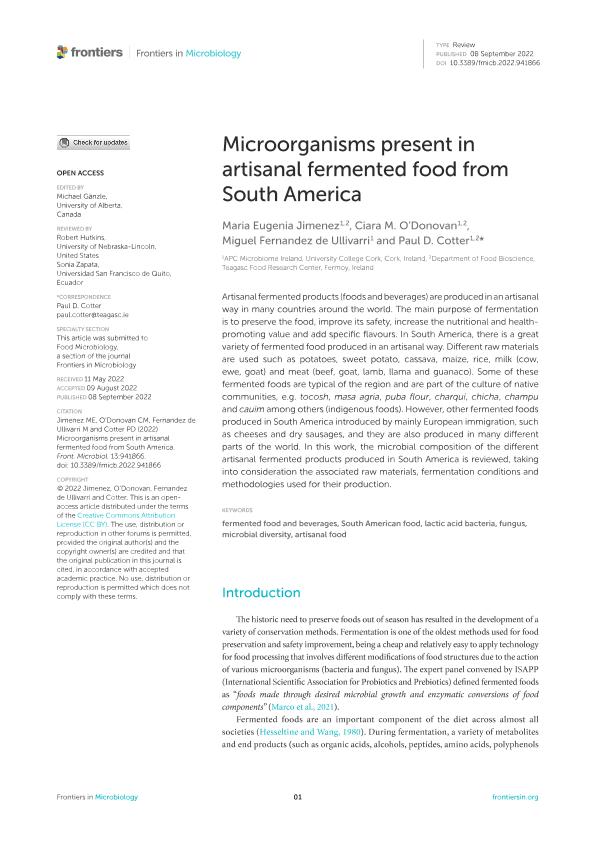Mostrar el registro sencillo del ítem
dc.contributor.author
Jimenez, María Eugenia

dc.contributor.author
O'Donovan, Ciara M.
dc.contributor.author
Fernandez de Ullivarri, Miguel

dc.contributor.author
Cotter, Paul D.
dc.date.available
2023-07-21T18:09:14Z
dc.date.issued
2022-09
dc.identifier.citation
Jimenez, María Eugenia; O'Donovan, Ciara M.; Fernandez de Ullivarri, Miguel; Cotter, Paul D.; Microorganisms present in artisanal fermented food from South America; Frontiers Media; Frontiers in Microbiology; 13; 941866; 9-2022; 1-18
dc.identifier.uri
http://hdl.handle.net/11336/204847
dc.description.abstract
Artisanal fermented products (foods and beverages) are produced in an artisanal way in many countries around the world. The main purpose of fermentation is to preserve the food, improve its safety, increase the nutritional and health-promoting value and add specific flavours. In South America, there is a great variety of fermented food produced in an artisanal way. Different raw materials are used such as potatoes, sweet potato, cassava, maize, rice, milk (cow, ewe, goat) and meat (beef, goat, lamb, llama and guanaco). Some of these fermented foods are typical of the region and are part of the culture of native communities, e.g. tocosh, masa agria, puba flour, charqui, chicha, champu and cauim among others (indigenous foods). However, other fermented foods produced in South America introduced by mainly European immigration, such as cheeses and dry sausages, and they are also produced in many different parts of the world. In this work, the microbial composition of the different artisanal fermented products produced in South America is reviewed, taking into consideration the associated raw materials, fermentation conditions and methodologies used for their production.
dc.format
application/pdf
dc.language.iso
eng
dc.publisher
Frontiers Media

dc.rights
info:eu-repo/semantics/openAccess
dc.rights.uri
https://creativecommons.org/licenses/by/2.5/ar/
dc.subject
ARTISANAL FOOD
dc.subject
FERMENTED FOOD AND BEVERAGES
dc.subject
FUNGUS
dc.subject
LACTIC ACID BACTERIA
dc.subject
MICROBIAL DIVERSITY
dc.subject
SOUTH AMERICAN FOOD
dc.subject.classification
Biología Celular, Microbiología

dc.subject.classification
Ciencias Biológicas

dc.subject.classification
CIENCIAS NATURALES Y EXACTAS

dc.title
Microorganisms present in artisanal fermented food from South America
dc.type
info:eu-repo/semantics/article
dc.type
info:ar-repo/semantics/artículo
dc.type
info:eu-repo/semantics/publishedVersion
dc.date.updated
2023-07-07T20:16:05Z
dc.identifier.eissn
1664-302X
dc.journal.volume
13
dc.journal.number
941866
dc.journal.pagination
1-18
dc.journal.pais
Suiza

dc.journal.ciudad
Lausana
dc.description.fil
Fil: Jimenez, María Eugenia. Teagasc - Irish Agriculture And Food Development Authority; Irlanda. Apc Microbiome Ireland; Irlanda. Universidad Nacional de Jujuy. Centro Interdisciplinario de Investigaciones en Tecnologías y Desarrollo Social para el Noa. - Consejo Nacional de Investigaciones Científicas y Técnicas. Centro Científico Tecnológico Conicet - Salta-Jujuy. Centro Interdisciplinario de Investigaciones en Tecnologías y Desarrollo Social para el Noa; Argentina
dc.description.fil
Fil: O'Donovan, Ciara M.. Apc Microbiome Ireland; Irlanda. Teagasc - Irish Agriculture And Food Development Authority; Irlanda
dc.description.fil
Fil: Fernandez de Ullivarri, Miguel. Apc Microbiome Ireland; Irlanda
dc.description.fil
Fil: Cotter, Paul D.. Apc Microbiome Ireland; Irlanda. Teagasc - Irish Agriculture And Food Development Authority; Irlanda
dc.journal.title
Frontiers in Microbiology
dc.relation.alternativeid
info:eu-repo/semantics/altIdentifier/doi/http://dx.doi.org/10.3389/fmicb.2022.941866
dc.relation.alternativeid
info:eu-repo/semantics/altIdentifier/url/https://www.frontiersin.org/articles/10.3389/fmicb.2022.941866/full
Archivos asociados
